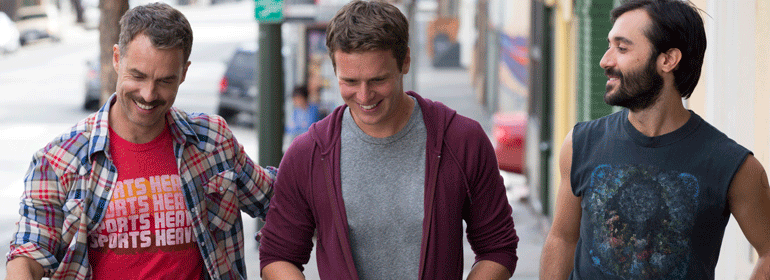Phil Prendergast MEP has a solution for tackling homophobic and transphobic bullying in our schools.
When being away from family and friends is as much a part of your job as it is for me, you tend to develop an unnatural affinity to life’s mundane creature comforts. Waking up to Morning Ireland and going to bed after a cup of Barry’s tea provide disproportionate levels of satisfaction after a long day in the office in a city like Brussels or Strasbourg.
There are also some modern variations on these age-old traditions which can help you relax at the end of a day away from your husband and children, and for me, I have developed a slight addiction to watching – and sometimes binge watching – TV series on the Internet.
A show which I have just gotten into this week, and which I cannot wait for the next episode to come out, is Looking, a series about a group of gay friends going about their daily lives in San Francisco. What strikes you when you watch the first episode is the sheer wonderful, glorious banality of gay life in this city. It was just so ordinary.
And this got me thinking – as a member of the LGBT-Intergroup of the European Parliament, what are the challenges for us as legislators to create a similar boring existence for LGBT individuals and their families in the European Union and the various diverse Member States of which it is constituted?
Here are the four simple things I came up with:
1. Marriage and Adoption
Same-sex marriage – and the accompanying parenting legislation – is the civil rights issue of our generation not just in Ireland, but across the EU. If we are truly to have free movement of people, then it is no less than inhumane that somebody would be your wife or husband in one EU member state, and a complete legal stranger in another. Or, and this is perhaps worse, that some is your child in one country, and not your child in another. The harmonization of the recognition of relationships must be a priority and it must begin with the updating of Art 12 ECHR and the removal of the restriction of the right to marry as being between “men and women”.
2. Completion of Anti-Discrimination Legislation
EU legislation currently outlaws, as a general principle, discrimination on the basis of sexual orientation. However, the space between the law and LGBT people’s daily lives is vast. Huge problems exist, for example, in my own profession of nursing and midwifery, in relation to access to healthcare for LGBT people and those who are HIV+. Similarly problems persist in education, access to goods and services and housing.
To address these the European Commission proposed a directive in 2008 with the aim of implementing current anti-discrimination rules. This has been blocked by Member States who argue that it will be too expensive. The outcome of this is that LGBT people suffer embarrassment and discrimination going about their daily lives. This has to stop. We need to de-clog the pipes of the European Council, so that we can de-clog the lives of LGBT individuals and their families.
3. Social Welfare Rights
This problem is related to the first but deserves a separate mention simply because of the amount of emails I get on this topic. It sounds mundane but it can really make a huge difference to people’s lives. As a consequence of the variety of different statuses given to same sex partners across the EU, attempting to ascertain, and then receive, social welfare benefits when you move country can be a legal nightmare.
This is also the case with issues like pension rights, widow and widower benefits and insurance cover. The legal shopping list is endless. The European Commission, on foot of much work undertaken by the LGBT Intergroup need to propose a specific regulation tackling social rights which form a basis of existing free movement legislation.
4. Homophobic and Transphobic Bullying
A 2013 report from the EU’s Fundamental Right’s Agency found that two thirds of LGBT individuals experienced homophobic or transphobic bullying in schools. Currently this issue seems to present more questions than there are answers.
On Tuesday next, the LGBT-Intergroup, together with ILGA Europe and IGLYO will host a special conference aimed at finding solutions to the issue of homophobic and transphobic bullying of young people. It is important that this is recognised as an issue that exists not just in Ireland, but across the European Union, and also that we work together with our European partners to identify best practice to find a way out for LGBT young people.
The EU’s culture and education programme can lead the way for Member States in stamping out homophobic and transphobic bullying.
 Phil Prendergast MEP is one of 12 Irish MEPs, and represents the constituency of Ireland South. Born in County Kilkenny, Phil worked as a midwife and nurse for over 20 years. Her career in politics began in 1985, when she became a trade union representative, later going on to become a Councillor, Senator and, in 2011, an MEP. Phil is a member of the European Parliament’s LGBT Intergroup. You can follow her on Twitter at @PrendergastMEP.
Phil Prendergast MEP is one of 12 Irish MEPs, and represents the constituency of Ireland South. Born in County Kilkenny, Phil worked as a midwife and nurse for over 20 years. Her career in politics began in 1985, when she became a trade union representative, later going on to become a Councillor, Senator and, in 2011, an MEP. Phil is a member of the European Parliament’s LGBT Intergroup. You can follow her on Twitter at @PrendergastMEP.
© 2014 GCN (Gay Community News). All rights reserved.
